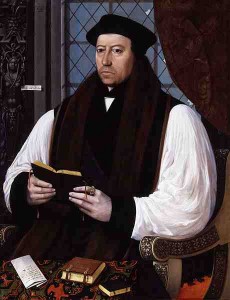 On 23rd May 1533, Archbishop Thomas Cranmer announced the sentence of the special court that had met at Dunstable Priory, Bedfordshire, to examine Henry VIII’s case for an annulment of his marriage to his first wife, Catherine of Aragon.
On 23rd May 1533, Archbishop Thomas Cranmer announced the sentence of the special court that had met at Dunstable Priory, Bedfordshire, to examine Henry VIII’s case for an annulment of his marriage to his first wife, Catherine of Aragon.
The trial had opened on 10th May 1533, following Convocation’s decision that the Pope did not have the power to dispense “in case of a marriage where the brother’s widow has been cognita” and Cranmer being issued a licence by Henry VIII “to determine his great cause of matrimony”. After hearing testimonies from people such as Dr John Bell, the King’s proctor; the Dowager Duchess of Norfolk and Lady Jane Guildford (both ladies refused to travel to Dunstable but depositions were taken), the opinions of universities and Convocation, and examining the proceedings of the Legatine Court at Blackfriars, the court came to a decision and Cranmer pronounced its sentence:
“My lord of Canterbury gave sentence this day at 11 o’clock in the great cause of matrimony; has declared it to be against the law of God, and has divorced the King from the noble lady Katharine. He has used himself in this matter very honorably, and all who have been sent hither on the King’s behalf have acted diligently and towardly. Sentence shall be given for the King’s second contract of matrimony before the Feast of Pentecost. The process is partly devised. 23 May.”
Cranmer then wrote to the King to inform him of the sentence. Henry VIII’s marriage to Catherine of Aragon had been annulled.
Notes and Sources
- MacCulloch, Diarmaid (1998) Thomas Cranmer: A Life, p93-94
- Kelly, Henry Ansgar (2004) The Matrimonial Trials of Henry VIII, p206-210
- LP vi. 525, Letter from John Tregonwell to Cromwell, 23rd May 1533
- Ibid., 529